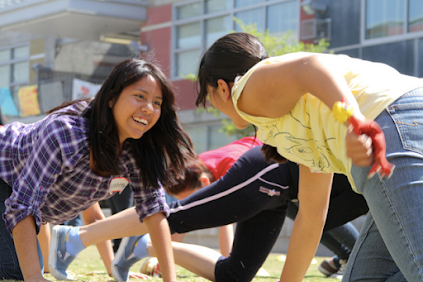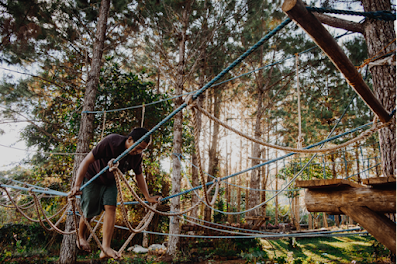 |
| Source: A World Fit For Kids |
By Sam Piha
Research suggests that physical activity and outdoor education can help young people recover from isolation and fear experienced due to the COVID pandemic. In this blog, we continue with our interviews with youth development experts, Ed Center from The Village Well and Brad Lupien and Bob Lund from ARC Experience.
“Adolescents coming of age during the pandemic have experienced social “learning loss,” and will need remedial support in social, not just academic, development, …. And at a time when recess and physical education programs may feel a squeeze from schools seeking more time for reading or math, studies suggest boosting students’ physical activity time also has an important role. It may help students rebound from the social isolation many have experienced during the pandemic.” - Sarah D. Sparks, Kids Are Feeling Isolated. P.E. May Help Them Bounce Back
Q: What are some physical activities you would recommend for youth in afterschool?
Ed- The most important thing is to offer a range of free or low-cost opportunities for different types of activity. I'm surprised that our culture still labels children as athletic or not based on just two factors: speed and coordination. If you can get to the ball first and do something cool with the ball, you are athletic. What about those who can run for miles, who find joy in the wilderness, who want to lean into their flexibility, who harbor hip-hop, half-pipe, or pirouette dreams?
Generally, after school programs do a decent job of exposing kids to different activities to explore interests and passions. My criticism is that public schools and afterschool programs usually fail to take the next step, giving youth opportunities to pursue those passions through deep engagement and mastery. Our programs offer the six-week karate enrichment options, but how do we support the kid who finds a calling and wants to go further? We chose our local park and recreation after school program for our kindergarteners because of the diversity of the students, and because they practice tennis every day (shoutout to Tennis Learning Center in San Francisco).
Brad and Bob- The simplest way to get students moving is to have them play. Offering opportunities to play games that don’t just reward the tallest or strongest students will encourage more participation rather than limiting it to the best athletes. From an outdoor perspective, introducing students to new challenges and experiences in a low-risk, low-pressure environment allows us to meet students where they are. On the simplest end, a simple hike to a new destination gets kids out and moving (and away from their phones). If resources allow, geocaching, kayaking, bike riding and rock climbing are all wonderful ways to encourage students to push their own boundaries, to explore their communities and to build their self-confidence, along with their physical strength.
 |
| Source: www.pexels.com |
Q: Are there any resources that afterschool leaders can use to develop physical activities for youth? Would you advise any training for staff and coaches?
Ed- The resources are already there in the community. The key is to provide program staff with time, flexible resources, and training in partnership development. Someone has a cousin who is passionate about West African dance and would love to bring that to the students. That person should be paid for their time and given a small budget for supplies or field trips. Let's stop the scarcity and tireless hustle mentality.
Brad and Bob- Many of us in education get caught up on the idea of having the right “gear” as the reason that we deliver boring physical activities, as if the equipment is what makes games fun. Many students are reluctant to try something new out of fear of failure, so training staff to encourage effort and participation, not just results is huge, as it builds an environment where all are welcome, not just the best athletes. Your staff can be your greatest asset in that they can leverage their existing relationships with students to get them to try something new and to push themselves—just a bit—out of their comfort zones. In that same vein, if staff are playing too, they will have more fun and you’ll see a sizeable increase in student participation as they can both more actively manage the game as well as provide behavioral role models for the activity.
MORE ABOUT...
 |
| Ed Center |
 |
| Brad Lupien |
 |
| Bob Lund |
ARC Experience is an award-winning, nationally recognized organization running afterschool and experiential education programs for the past 20 years in communities throughout California. They provide afterschool, outdoor, enrichment, and leadership development to elementary, middle, and high school students as well as college students and professionals.
- Your reactivity profile,
- Closing the stress cycle,
- Regulation techniques for kids and grown-ups,
- Mindfulness for the fidgety,
- Personal wellness plans,
- What to do when the sh*t hits the fan






No comments:
Post a Comment